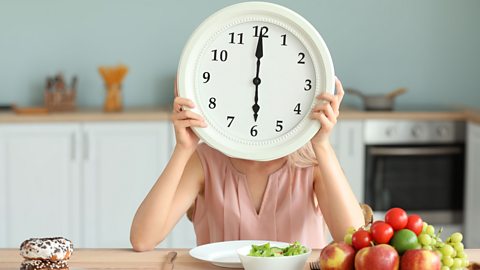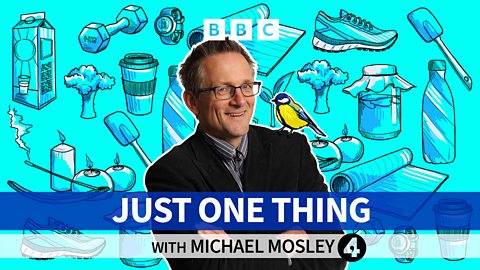Have we got our meal times all wrong?
When it comes to healthy eating, we tend to focus on what’s on our plate, but should we also think about when we eat?
Eating a bigger breakfast could help to absorb more nutrients, while eating your last meal of the day earlier could help maintain a healthy weight. So when exactly should we tuck in?

Meal times and weight loss
With one in four people in the UK said to be obese, could changing our meal times be an effective way of maintaining a healthy weight? Science says yes. There have been multiple studies that explore how the timing of meals impacts how a person's weight. Those participants who ate their main meal of the day earlier, and a much smaller meal after 3pm, lost weight or maintained a lower weight more easily than those who had their largest meal later.
Scientists are still trying to establish exactly why. University of Aberdeen’s Professor Alexandra Johnstone is currently carrying out research on the link between our circadian rhythms and how we metabolise food, a field of science known as chrononutrition. In The Big Breakfast Study Johnstone and colleagues highlight the growing evidence that we’re better at metabolising food earlier in the day: “Recent studies in humans have shown that ingested calories are apparently utilised more efficiently in the morning than in the evening and this is manifested through improved weight loss.”
But even though people who eat earlier tend to be leaner, it isn't a magic solution. "Chrononutrition is an evolving and developing field of science which is beginning to show how our ancient biology is in conflict with our modern lifestyle. The mechanisms behind why time of eating may influence health are not entirely clear.”
Johnstone explains that when it comes to weight loss, what’s on the plate is still the most important thing to consider. “We need to consider the whole diet rather than single foods or meals. An occasional croissant or Danish pastry is not going to make you obese in one meal, but consuming energy dense foods along with a sedentary lifestyle, over time, will.”
Closing the "eating window"
Research carried out by Jonathan Johnston, Professor of Chronobiology and Integrative Physiology at The University of Surrey, suggests there could also be a link between weight loss and eating meals within a a smaller window of time.
Pointing out it was a pilot study, and further research and is being carried out, the study saw healthy, but slightly overweight, participants delay their first meal of the day by an hour and a half. They then ate their last meal of the day an hour and a half earlier. They were directed to eat their regular food rather than go on a diet. “People actually consumed fewer calories and had less energy intake per day when they had their restricted feeding window,” says Johnston.
Johnston doesn’t rule out that this could in part be due to metabolic changes, but adds: “The fact they consumed less, was an interesting and important result… we showed the group following restricted feeding lost some of their fat tissue.” Johnston points out though this didn’t equate to an overall loss of body weight. “Probably because fat tissues are only one proportion of our overall body weight and so the effects weren't big enough to translate to overall body size… but potentially there was a benefit to their fasting blood sugar concentration.”
Related stories
Could an early breakfast mean a longer life?

If you consume your first meal of the day early, then one observational study from City University New York (CUNY) suggests there could be a link between this and lower mortality levels.
The study saw researchers assess more than 34,000 US adults over two periods, spanning three decades in total. Assessing people’s ‘clock time’, they looked to see if there was a pattern between when people consume their first meal and mortality rates – of any cause. Professor Ashima Kant, chairperson of Queens College’s Family, Nutrition, and Exercise Sciences department conducted the research.
“There is existing evidence that timing of eating may be linked to energy use and storage in the body. One of the possible explanations is due to a possible mismatch between when nutrients are consumed and the timing of release of the body’s metabolic machinery for using the nutrients,” says the expert.
Kant’s study used various markers to check for benefits and detriments to health including body weight, cholesterol and insulin in the blood. The study wasn’t looking for optimum times for eating and good health, they were looking at the opposite, “our primary outcome was risk of dying from any cause by the end of December 2015.”
So, could there be a time when eating the first meal of the day would be linked to a lower rate of mortality? “In this study, the median time of first eating episode of 7:00am in men and 7:15am in women was linked to a lower risk of dying after a median of eight years of follow-up,” says Kant.
However, the expert isn’t willing to jump to conclusions about why eating later could be detrimental to mortality, explaining it “may not coincide with the time of release of hormones needed for metabolic utilization of nutrients. This is a possible reason, but we did not examine this issue, our study is observational.”
Michael Mosley: Just One Thing. podcast
Change Your Mealtimes

When to have your ‘big’ meal of the day
“I think the weight of the evidence, so far, shows we should try and reduce evening intake,” says Professor Johnston. “Have your last energy intake of the day, as early as possible. That is probably the clearest message that we have.
“The reason for that is we seem to lose sensitivity to insulin as the day goes on. Decades ago, people coined the phrase ‘afternoon diabetes’. It showed people were less tolerant of sugar later in the afternoon and in the evening compared to how they were in the morning.
“Various studies have shown your internal circadian body clock is a strong regulator of your metabolism. Essentially, you process a meal much more efficiently in the morning than you do in the evening. So, if you eat a meal in the evening, you tend to get higher concentrations of sugar, and fat in the blood, and it takes longer for that to go back down to normal conditions. And so, we know that having prolonged sugar and fat in your blood is a health risk for various cardiac and metabolic diseases.
"It's not a huge leap, to show if you are habitually having a lot of energy later in the day, you're going to have a longer, elevation of sugar and fat and your blood, therefore, this could contribute to your risk for diseases.”

“The most common pattern of eating in the UK is to consume most of our daily calories in the evening – roughly 40 percent of our daily energy intake – and fewer calories in the morning,” says Professor Alexandra Johnstone, before adding: “UK current healthy eating advice is based around the long-held assumption that ‘a calorie is a calorie’ and that meal timing is inconsequential.
Johnstone concludes: “It is of course the type of foods you choose and portion sizes that have the biggest impact on your health. But if it is the case that time of eating is linked to body weight and health, then we will be able to give better dietary advice to people not only related to nutritional content but also of time of eating.”
Originally published February 2022



